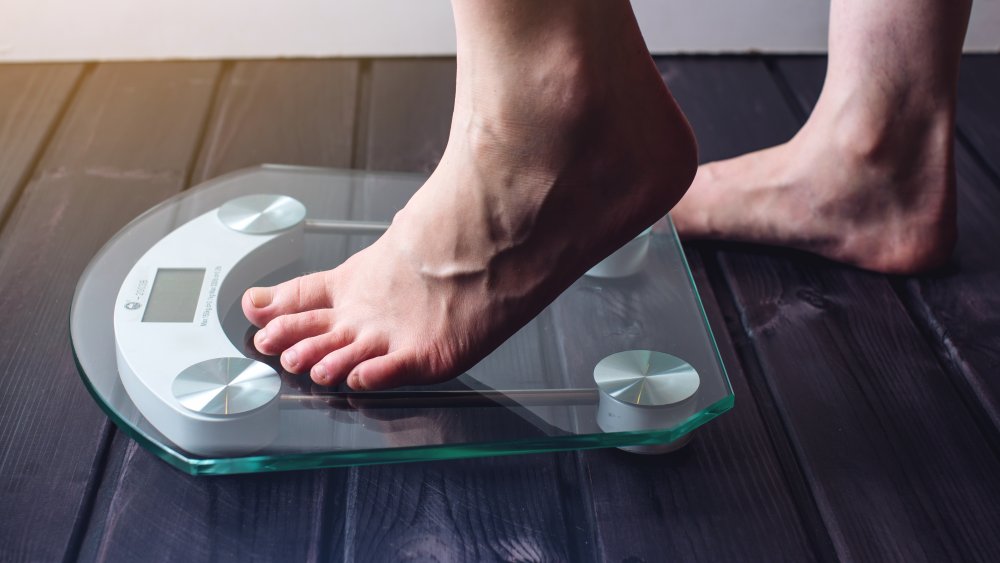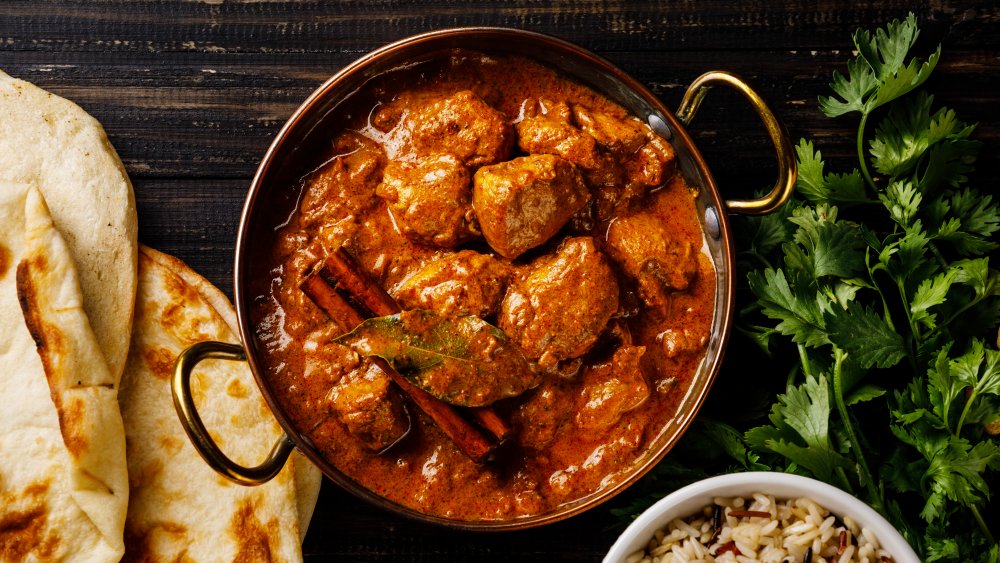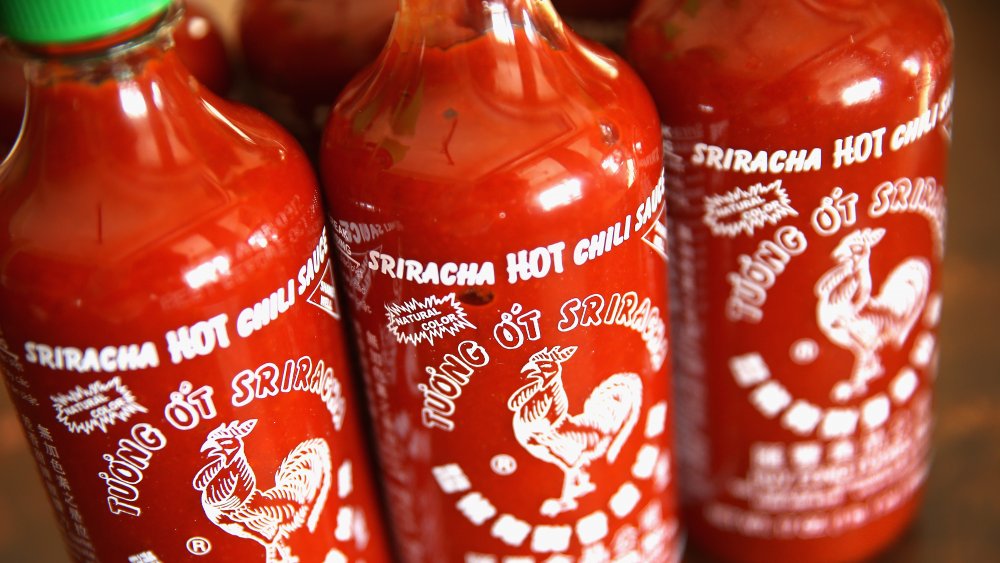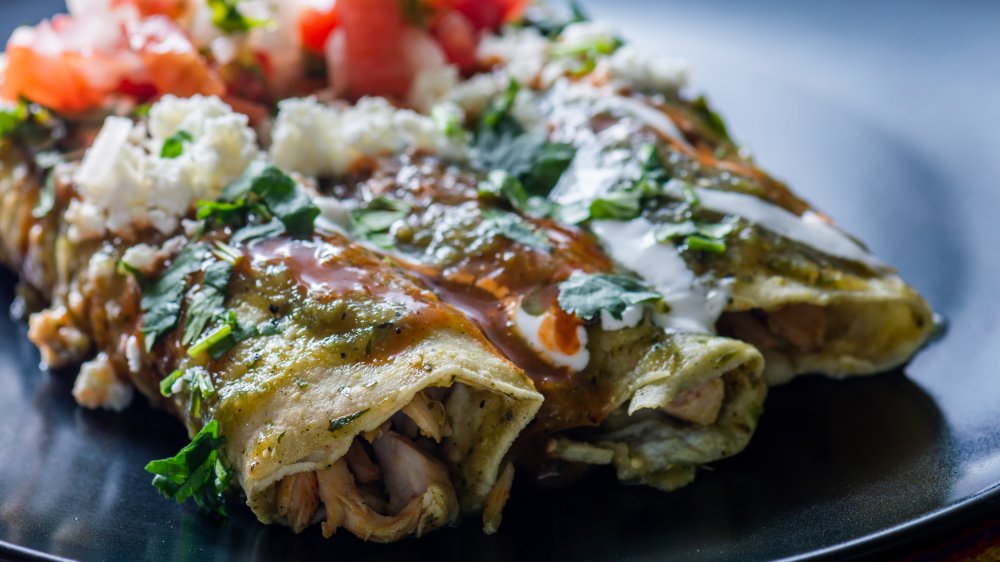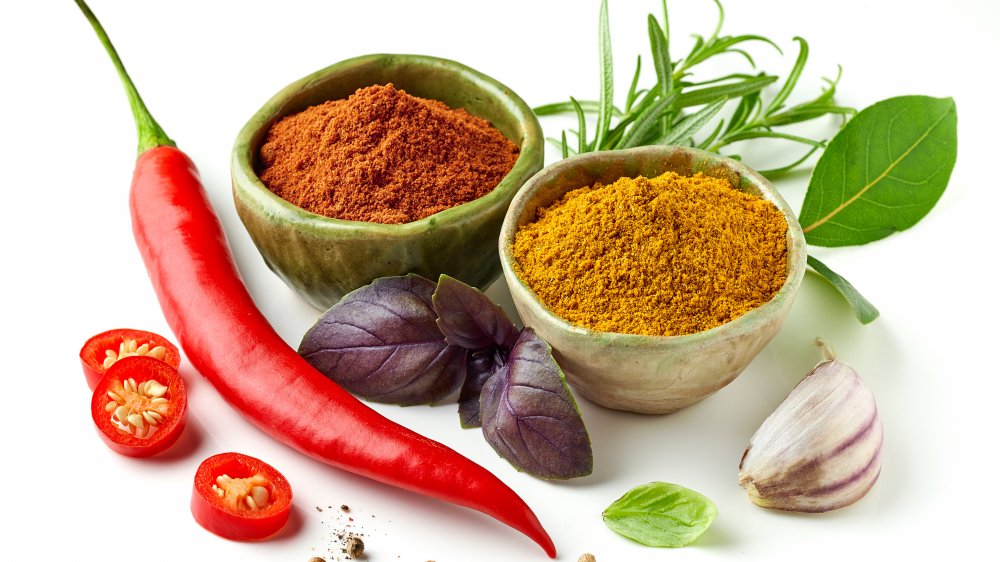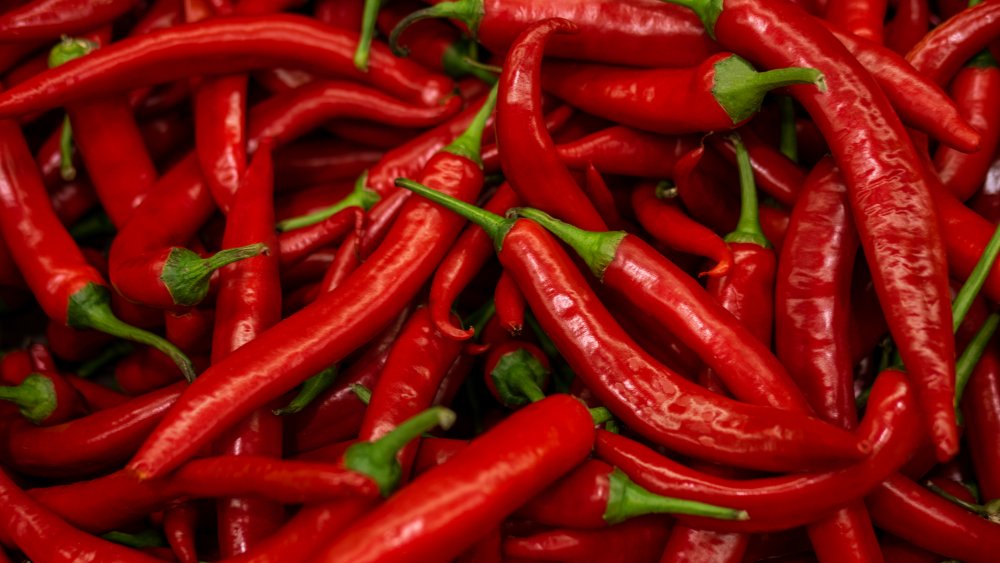When You Eat Spicy Food Every Day, This Is What Happens To Your Body
Are you a bona fide spicy food junkie? If you start salivating when simply thinking about jalapeño poppers, cayenne pepper salsa, or habanero hot sauce, signs point to yes. It's pretty likely that you have a spice cabinet stocked with a variety of ground peppers to ensure there's always a bit of heat in your kitchen.
Fortunately for those who love a fiery kick, spicy foods can be found in a variety of global cuisines, including Thai, Indian, and Mexican dishes, to name just a few. That shows just how universal the love for spicy food is around the world — and how versatile these flavor-enhancing peppers can be. It's no wonder, then, that many folks find themselves chowing down on spicy foods — whether a plate of enchiladas or tandoori chicken — every day.
If you're someone who douses your food in Sriracha at every meal, have you ever stopped to consider what it's doing to your body? Read on to find out the health benefits and risks of eating spicy food every day.
You may lose weight if you eat spicy food every day
It's not easy to lose weight, nor is it a walk in the park to keep it off. In order to do so, you have to make permanent changes to your diet and exercise habits, as well as to your lifestyle, according to Harvard Medical School. It also can't hurt to add a little jalapeño to your food, according to certified personal trainer Adam Kemp.
"If you eat spicy food every day, there is a good chance that it can help you lose weight or maintain weight loss," the expert divulged to The List. "That's because one of the most common components of spicy food (capsaicin) has been researched and proven to assist with weight loss and help maintain weight loss."
However, that doesn't mean the spice negates the calories in your spicy butter chicken or shrimp fra diavolo recipe, noted Kemp. "Although you still need to maintain a calorie deficit in your diet to lose weight, adding the ingredient capsaicin has been shown to help stimulate your metabolism," he continued. And that can cause lasting change.
Eating spicy food every day may help you manage pain
Some people don't enjoy spicy food as they find eating it to be unpleasant and, in some cases, even painful. But interestingly enough, eating foods with lots of heat every day may help you to feel less pain, registered dietitian Mitchelle Wright revealed to The List. "The potential for spicy food to relieve certain sources of pain is fairly well documented in academic research," she explained. Who knew that hot sauce wielded that kind of power?
So, what specifically is at play here when it comes to spicy food and decreased pain levels? "It is theorized that foods that are rich in capsaicin can potentially target a chemical within the brain known as substance P, which plays a role in the pain your body feels from injuries," Wright continued. She added that several studies have suggested that by targeting this substance, capsaicin may be able to decrease the amount of pain as a result of the aforementioned injuries.
Believe it or not, eating spicy food every day can prevent peptic ulcers
If you've ever had a peptic ulcer, you might be tempted to think that the culprit is all that Tabasco sauce you're pouring on top of your eggs. But, as it turns out, it's a common misconception that eating spicy food every day can cause you to develop ulcers, according to gastroenterologist Edwin McDonald.
"Contrary to popular belief, multiple studies show that capsaicin actually inhibits acid production in the stomach," he penned in an article for the University of Chicago Medical Center. "As a matter of fact, capsaicin has been considered as a medication for preventing ulcer development in people who take non-steroidal anti-inflammatory drugs."
The real causes for ulcers are a world away from spicy foods, revealed McDonald. "People frequently ignore the fact they are taking ibuprofen 'around the clock' or that they may have a bacteria called H. Pylori," he continued. In fact, H. Pylori is one of the most common causes of ulcers, which exonerates chili peppers from any ulcer-related crimes.
Eating spicy food every day may boost your immune system
If there's one thing that the year 2020 has proven, it's that having a strong and healthy immune system is a real asset. That may explain why plenty of folks started doing all they could to bolster their body's natural defenses, including taking supplements and eating a targeted diet. Hey, you can't be too careful, right?
If you're particularly invested in doing the maximum to boost your immunity, you may also want to consider eating spicy food every day. "Spicy foods are known as a holistic immune system booster," certified nutritionist Katie Boyd revealed to The List. "The spices contain antioxidants that will protect against bacteria and microbes that enter the body."
In fact, that's why former Secretary of State Hillary Clinton eats a fresh hot pepper every day. It's something she started doing after reading an article about the benefits it can provide the body, Clinton told NPR. "It's certainly possible that some of the compounds found in chili peppers could be protective of health," food science professor John Hayes told the outlet.
Can eating spicy food every day fight cancer?
Cayenne and Scotch bonnet peppers aren't the only spices can aid the body. Turmeric, which is notably found in Indian cuisine, is also a player in the spice world with health benefits, according to oncologist Dr. Cary Present. "Curcumin has astonishing effects in cancer cells," he shared in an interview with HuffPost. "There is good laboratory evidence that it works in reducing the growth of cancer cells and preventing them as well."
But we'd be remiss if we didn't mention the power of capsaicin — the component that gives chili peppers their unique kick — in the fight against cancer, as it's no slouch on that front. According to a study published in the Canadian Urological Association Journal, capsaicin managed to kill off 80 percent of prostate cancer cells in rodents while causing no damage to healthy, normal cells. "The capsaicin blocks the cancer cells," explained nutritionist Pamela Peeke. That's not to say that curcumin and capsaicin are substitutes for medical care, of course, but they're certainly worthy of landing a spot on your plate every day.
If you eat spicy food every day, you might live longer
Undoubtedly, most people aspire to live a long, healthy, and happy life full of love and richness. Fortunately for fans of all things spicy, science says fiery foods can increase your longevity, a study published in The BMJ revealed. "In this large prospective study, the habitual consumption of spicy foods was inversely associated with total and certain cause specific mortality, independent of other risk factors of death," the study's authors wrote. And the more you consume spicy foods, the better.
"Compared with those who ate spicy foods less than once a week, those who consumed spicy foods six or seven days a week showed a 14 percent relative risk reduction in total mortality," the authors continued. However, those life-giving properties were neutralized when alcohol was involved. So if you're striving to make it as long as possible, put down the booze and pick up the curry.
You may crave less sugar if you eat spicy food every day
For most people, it's healthy to consume natural sugars, like those found in fruit, in moderation. However, consuming added or processed sugar in excess can lead to a host of health problems, like heart disease, type II diabetes, and some cancers, according to Harvard Medical School.
Fortunately, folks who eat spicy food every day may find that their sugar cravings have decreased, as noted by registered dietitian Bonnie Taub-Dix. "After having the hot and spicy taste in your mouth, you usually don't want cookies afterward," she shared in a chat with Women's Health. Kind of like drinking orange juice right after you brush your teeth, isn't it? The expert continued, saying, "I've had patients say that when they have chili sauce or jalapeño, they're satisfied because it feels like they've hit the spot."
Your teeth will also appreciate your decision to choose spice over sugar, as the sweet stuff wreaks havoc on your oral health, according to Healthline. All the more reason to pass the Cholula!
If you eat spicy food every day, you can clear your sinuses
Whether it's due to an illness or because of an allergic reaction, a runny nose is no fun. Fortunately, spicy food is nature's decongestant — it can clear your sinuses right out, according to registered dietitian Cynthia Sass. "If you've ever had a runny nose after eating something spicy you've experienced this effect," she penned in an article in Health. "The capsaicin in peppers is similar to a compound found in many decongestants, so the hotter the pepper the greater the impact." That's especially good news for ghost pepper-lovers, as that little red pepper packs a serious wallop.
Capsaicin is good for your nasal membranes in another way as well, per Sass. "They're a rich source of vitamin A, which helps to form strong mucous membranes, which serve as a barrier to prevent germs from getting into your body," the expert continued.
Looking to combat inflammation? Eat spicy food every day
While it's normal for your body to experience inflammation in response to harm, like a laceration, other forms of inflammation can cause a variety of problems, according to Medical News Today. Fortunately, eating spicy food every day can help curb inflammation.
"If you like your spice from salsa and peppers, you are consuming several beneficial plant compounds that may reduce inflammation," registered dietitian Jill Trotman told The List. "The peppers that give spice to salsa contain capsaicin, the phytochemical responsible for the spiciness." Capsaicin for the win!
The curcumin found in turmeric, however, may not be as beneficial. "While it is touted in popular press to have anti-inflammatory properties, strong human studies are not available at this time," the expert explained. Trotman added that the National Center for Complementary and Integrative Health has indicated turmeric as beneficial in a variety of ways, but more research is needed to confirm that to be true.
Your heart will be happy if you eat spicy food every day
According to the World Health Organization, cardiovascular disease is the leading cause of death around the world by a significant margin. So if you want to do all that you can to keep your ticker intact, try eating spicy food every day.
"Hot peppers have been shown to lower heart disease risk by decreasing levels of 'bad' LDL cholesterol, increasing 'good' HDL, and improving circulation," registered dietitian Cynthia Sass wrote in an article in Health. "In fact, capsaicin is currently being studied for its ability to treat circulatory problems, hardening of the arteries, and irregular heart rhythm." That's a pretty compelling reason to bring on the serrano peppers! According to Sass, adding spice to your meals can stand in for salt, which will also help keep your heart happy.
Even if you aren't particularly worried about your heart health, Sass revealed another near-magical effect that comes from consuming spicy food: It can keep you looking fresh and young. "Hot peppers also contain an impressively long list of antioxidants, including those known to help fend off aging," the expert explained.
Your palate may change if you eat spicy food every day
If you don't eat spicy food every day, you may be intimidated to start. This is especially true if you've had a bad experience in the past. But if you do chow down on Sriracha-covered noms on the reg, you may find that your sense of taste changes, certified nutrition coach Elliott Reimers told The List. "You are more than likely to see a change in your palate because your taste will start to get used to the level of spice you are eating," he divulged. "It may be that you find yourself needing to up the spice level to get the same flavor explosion you originally got from spice."
While that's probably fine for most folks, Reimers cautions spice fiends to proceed with caution. "Be careful not to push it too far though, because too much spice can also temporarily make other foods tasteless," he continued. "You don't want to ruin all other food you are eating just for the sake of some spice!"
Depending on your stomach sensitivity, eating spicy food every day can help you stay regular
Eating spicy food every day can help to keep you regular, according to registered dietitian Bonnie Taub-Dix. "It triggers you to drink more water, which helps with constipation," she told Women's Health.
However, if you have a more sensitive system, you may be prone to the opposite once the food hits your colon, according to gastroenterologist Kenneth Brown. "Here, the process normally slows down, but those receptors are being excessively activated and as a defense, the colon speeds the whole process up," he penned in an article for Verywell Health. "This does not allow the colon to absorb water and ultimately makes us run to the restroom with diarrhea." And if you've been there, you know how unpleasant it can be.
If you're in the latter category, make sure to stay hydrated and lay off the spice for a few days until everything clears up, Brown advised.
Eating spicy food every day can aggravate gastrointestinal conditions
Some gastrointestinal conditions can make eating spicy food every day a bad idea, as noted by registered dietitian Amanda A. Kostro Miller. "Along with alcohol, dairy, or high FODMAP foods, spicy foods can be a common trigger for those with Crohn's disease," she revealed to The List. As such, she recommended speaking with "a registered dietitian for more personalized Crohn's recommendations."
Furthermore, foods packed with heat can't can be seriously irritating for folks with another condition, according to gastroenterologist Edwin McDonald. "A study in 2008 demonstrated that spicy foods aggravate symptoms associated with anal fissures," he penned in an article for the University of Chicago Medical Center.
Aggravating this condition spells even more trouble as "anal fissures are extremely painful" as is, according to the doctor. "'Make a grown adult cry' painful," McDonald added. To that end, folks with such conditions should avoid eating spicy food every day. Of course, talk to your doctor to be sure.
Eating spicy food every day may exacerbate heartburn
If you don't suffer from any esophageal issues, you can mow down a plate of hot wings every day with wild abandon, should you so desire. But that isn't the case for everyone. Some folks can have an adverse reaction to heat, according to registered dietitian Amanda A. Kostro Miller. "Spicy foods are one of many trigger foods for those with heartburn," she explained to The List. While that can be abated with an antacid or other medications, heartburn isn't exactly pleasant and can even cause long-term damage.
That's not the end of it either, thanks to other foods that often go hand-in-hand with heat, Kostro Miller revealed. "Spicy foods may be paired with other trigger foods like alcohol, acids, tomato-based foods, liquid, fried foods, or other fatty foods," she continued. While the flavors may pair well together, they create a perfect storm for indigestion. "This can be especially [harmful] to people who regularly suffer from heartburn," according to the expert. If you struggle with gastroesophageal reflux disease (GERD), it's not exactly in your best interest to continue eating spicy food — especially when paired with other trigger foods — every day.

